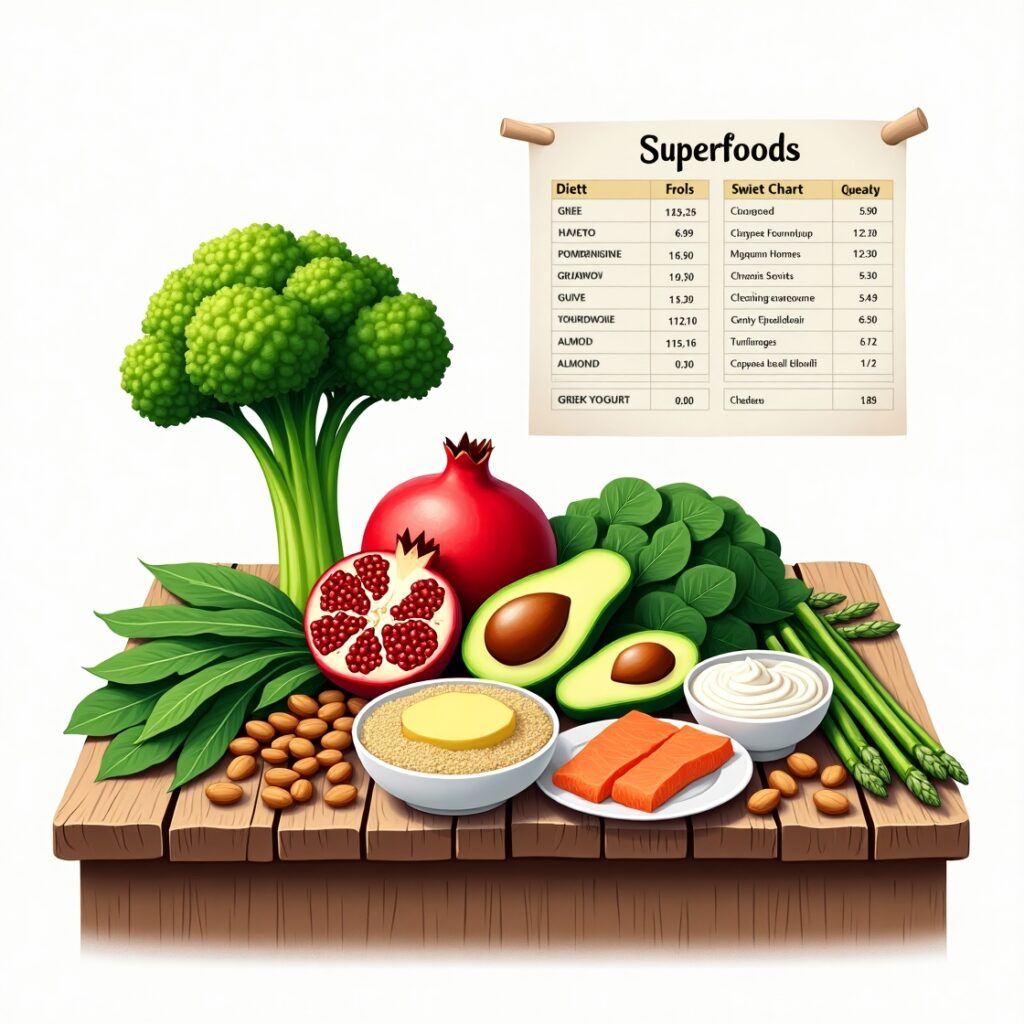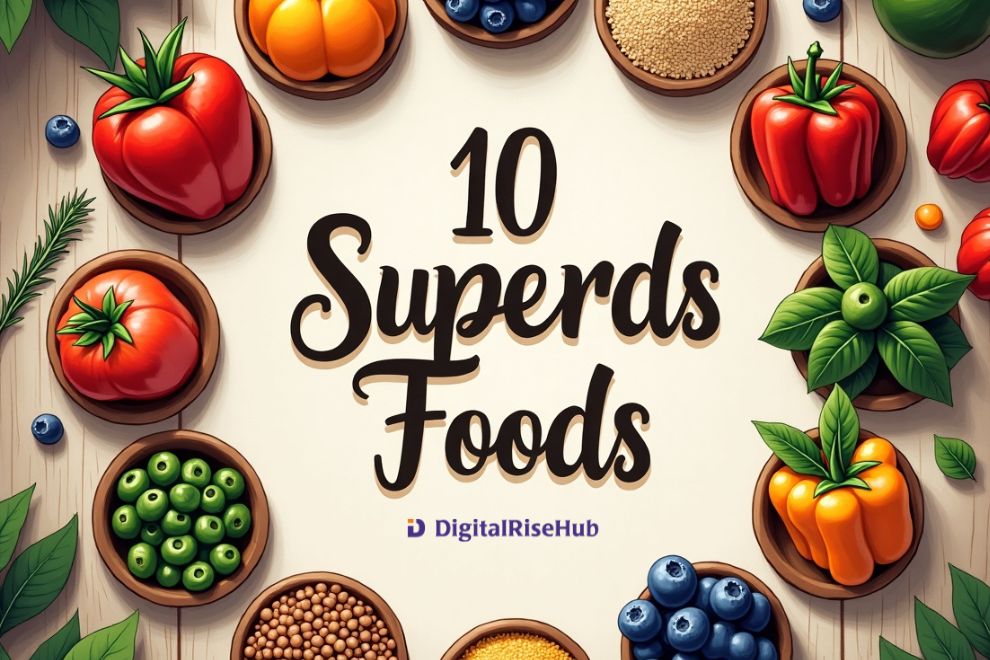In our modern, health-conscious world, the term “superfood” is gaining popularity as a way to describe foods that offer maximum nutritional benefits for minimum calories. Superfoods are packed with vitamins, minerals, and antioxidants, making them essential for maintaining optimal health. Incorporating these foods into your daily diet can improve overall well-being, boost energy levels, and help prevent chronic diseases. In this article, we will delve into 10 superfoods that should be part of your regular diet to enhance your health.
What Are Superfoods?
Superfoods are nutrient-dense foods that provide an abundance of beneficial compounds. Unlike processed foods, these whole foods are rich in essential nutrients that support bodily functions, prevent diseases, and promote longevity. Superfoods typically offer a combination of antioxidants, vitamins, fiber, and healthy fats. Whether you’re looking to improve your heart health, boost your immune system, or manage your weight, superfoods should be a key element in your healthy eating routine.
1. Blueberries: The Antioxidant Powerhouse
Blueberries are well-known for their high antioxidant content, especially anthocyanins, which give them their vibrant color. Antioxidants help to neutralize free radicals in the body, reducing oxidative stress and lowering the risk of chronic diseases such as cancer and heart disease. Additionally, the compounds in blueberries are shown to support brain function, improve memory, and potentially delay age-related cognitive decline.
Nutritional Benefits:
- High in vitamin C and vitamin K.
- Rich in dietary fiber.
- Supports heart and brain health.
How to Add Blueberries to Your Diet:
- Top your morning oatmeal or yogurt with fresh blueberries.
- Add them to smoothies or baked goods like muffins.
- Enjoy them as a simple, nutritious snack.
2. Kale: The Nutrient-Dense Green
Kale is one of the most nutrient-packed leafy greens available. It’s rich in vitamins A, C, and K, which support immune function, skin health, and bone strength. Kale also contains powerful antioxidants, including quercetin and kaempferol, which have been linked to anti-inflammatory effects and improved heart health. With its high fiber content, kale aids digestion and promotes healthy gut function.
Nutritional Benefits:
- A potent source of vitamins A, C, and K.
- Excellent for digestive health due to its high fiber content.
- Rich in antioxidants to combat inflammation.
How to Add Kale to Your Diet:
- Toss fresh kale into salads.
- Blend kale into smoothies for a green boost.
- Sauté kale as a side dish or add it to soups and stews.
3. Chia Seeds: A Small Superfood with Big Benefits
Chia seeds are tiny but mighty, packed with omega-3 fatty acids, fiber, protein, and essential minerals like calcium and magnesium. These seeds are particularly beneficial for heart health, as omega-3s help reduce inflammation and improve blood circulation. Additionally, chia seeds are an excellent source of fiber, which promotes healthy digestion and keeps you feeling fuller for longer.
Nutritional Benefits:
- Rich in omega-3 fatty acids.
- High in fiber and protein.
- Supports digestive and cardiovascular health.
How to Add Chia Seeds to Your Diet:
- Stir chia seeds into smoothies or yogurt.
- Use them to make chia pudding by soaking them in almond milk overnight.
- Sprinkle on salads or baked goods for a nutritional boost.
4. Salmon: A Heart-Healthy Protein
Salmon is widely regarded as one of the best sources of omega-3 fatty acids, which are crucial for maintaining heart health. Omega-3s help lower triglycerides, reduce blood pressure, and improve overall cardiovascular function. Along with its omega-3 content, salmon is an excellent source of protein, vitamin D, and selenium, which support muscle health, bone strength, and immune function.
Nutritional Benefits:
- High in omega-3 fatty acids for heart health.
- Provides a rich source of protein and vitamin D.
- Boosts immune system health with selenium.
How to Add Salmon to Your Diet:
- Grill, bake, or pan-sear salmon with your favorite herbs.
- Add it to salads or serve alongside roasted vegetables.
- Incorporate it into pasta dishes or grain bowls for a nutritious meal.
5. Avocados: The Creamy Superfood
Avocados are a versatile and creamy superfood that offers a range of health benefits. They are rich in healthy monounsaturated fats, which help improve cholesterol levels and support heart health. Avocados also contain potassium, which plays a key role in maintaining healthy blood pressure levels, and fiber, which aids in digestion and promotes a sense of fullness.
Nutritional Benefits:
- Rich in monounsaturated fats for heart health.
- Packed with potassium to regulate blood pressure.
- High in fiber for improved digestion.
How to Add Avocados to Your Diet:
- Spread avocado on whole-grain toast or sandwiches.
- Add sliced avocado to salads and tacos.
- Use mashed avocado as a base for creamy dressings or dips.
6. Spinach: A Leafy Green for Strong Health
Spinach is one of the best leafy greens for enhancing your health. It’s packed with nutrients like iron, calcium, vitamin K, and folate. Spinach is particularly beneficial for maintaining strong bones, improving blood circulation, and supporting healthy skin. The high levels of antioxidants in spinach, including lutein and zeaxanthin, are great for eye health, helping protect against age-related macular degeneration.

Nutritional Benefits:
- Excellent source of iron and calcium.
- High in antioxidants for eye health.
- Boosts energy and supports strong bones.
How to Add Spinach to Your Diet:
- Blend spinach into smoothies or juices.
- Use it as the base for fresh salads.
- Add spinach to soups, stews, or pasta dishes for a nutrient boost.
7. Almonds: A Nutrient-Packed Snack
Almonds are a popular nut known for their numerous health benefits. They are an excellent source of healthy fats, fiber, protein, and vitamin E, a powerful antioxidant that supports skin health and immune function. Regular consumption of almonds has been shown to improve cholesterol levels, reduce inflammation, and even help with weight management by promoting feelings of fullness.
Nutritional Benefits:
- High in healthy fats, fiber, and protein.
- Rich in vitamin E for skin and immune health.
- Helps with weight management by increasing satiety.
How to Add Almonds to Your Diet:
- Enjoy a handful of almonds as a snack.
- Add almond butter to smoothies or toast.
- Incorporate chopped almonds into baked goods or salads.
8. Sweet Potatoes: A Fiber-Rich Root Vegetable
Sweet potatoes are not only delicious but also incredibly nutritious. They are an excellent source of complex carbohydrates, which provide a steady source of energy without causing blood sugar spikes. Sweet potatoes are also rich in beta-carotene, a precursor to vitamin A, which is essential for eye health, immune function, and healthy skin.
Nutritional Benefits:
- Packed with beta-carotene for eye and immune health.
- Rich in fiber for digestive health.
- A great source of complex carbohydrates for sustained energy.
How to Add Sweet Potatoes to Your Diet:
- Roast sweet potatoes as a side dish or snack.
- Make mashed sweet potatoes or sweet potato fries.
- Add cubed sweet potatoes to stews, curries, or salads.

9. Turmeric: The Anti-Inflammatory Spice
Turmeric has been used for centuries for its medicinal properties, particularly its ability to reduce inflammation. The active compound in turmeric, curcumin, has powerful anti-inflammatory and antioxidant effects. Regular consumption of turmeric has been linked to reduced risk of chronic diseases such as arthritis, heart disease, and certain types of cancer.
Nutritional Benefits:
- Reduces inflammation and oxidative stress.
- Supports joint health and mobility.
- May help reduce the risk of chronic diseases.
How to Add Turmeric to Your Diet:
- Use turmeric in curries, soups, or stews.
- Stir turmeric into smoothies or make turmeric tea (golden milk).
- Add a pinch of turmeric to roasted vegetables or grain bowls.
10. Greek Yogurt: A Probiotic Powerhouse
Greek yogurt is a delicious and versatile food that provides numerous health benefits. It’s packed with protein, probiotics, and calcium, making it excellent for digestive health, bone strength, and muscle recovery. The probiotics in Greek yogurt support a healthy gut microbiome, which is crucial for immune function and overall well-being.
Nutritional Benefits:
- High in protein for muscle repair.
- Rich in probiotics for gut health.
- Provides calcium for strong bones and teeth.
How to Add Greek Yogurt to Your Diet:
- Enjoy Greek yogurt as a snack with fresh fruit and nuts.
- Use it as a base for smoothies or salad dressings.
- Add it to baked goods or use it in savory dishes like tzatziki.
Adding these 10 superfoods to your diet is an easy and effective way to enhance your overall health. Each superfood offers a unique combination of vitamins, minerals, antioxidants, and healthy fats that work together to boost immunity, improve digestion, support heart health, and more. By including a variety of these superfoods in your daily meals, you can provide your body with the nourishment it needs to thrive.
Incorporate these superfoods into your diet today and start reaping the health benefits of a nutrient-rich lifestyle. Whether you choose to add them to smoothies, salads, or snacks, your body will thank you for it.


